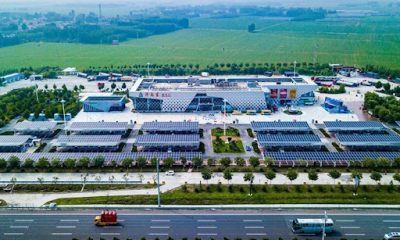News
Story behind re-germination of seeds collected on Mount Qomolangma

By Zhang Fan, Yang Wenming, Li Maoying, People’s Daily
In September 2021, Chinese researchers collected the seeds of Desideria himalayensis at an altitude of 6,212 meters at the East Rongbuk Glacier on Mount Qomolangma, setting a new record for plant seed collection at the highest altitude in China.
In July this year, seeds of five species of plants collected during the seed-collection mission on Mount Qomolangma successfully germinated after being preserved in cold storage at minus 20 degrees Celsius for nearly a year.
The success of the germination experiment means that China has collected and preserved the seeds of a plant found at the highest altitude globally so far and laid a foundation for relevant research into germplasm resources in the future.
On Sept. 24, 2021, Guo Yongjie, Zhao Yanhui, and the other six members of the team tasked with the seed-collection mission climbed Mount Qomolangma for the second time, following their first trip in August.
Prior to that, only 15 species of plants were publicly known to have been collected at a height of over 6,100 meters.
In the area referred to as the “forbidden zone of life”, where it is windy, extremely cold, and lacks oxygen, researchers must be very careful with every step they take on their way up the mountain.
The team set off from the transition camp at an altitude of 5,800 meters, and reached a height of around 6,200 meters several hours later.
“Desideria himalayensis,” Guo cried at the sight of the plant that wears camouflage colors. After recognizing the plant growing in a crevice, Guo immediately laid on his stomach to take pictures of it from all angles and recorded the altitude and other information about the spot where the plant was found.
The plant that grew at an altitude of 6,212 meters was the first plant they found at altitudes above 6,000 meters. What made Guo more excited was that some of the siliques of the Desideria himalayensis had split, which meant the team had a chance to collect the seeds of the plant.
Just after Guo collected the Desideria himalayensis, Mount Qomolangma in the distance revealed itself. Seeing the tiny, fragile branches of the plant sway in the wind in stark contrast to the snow-capped mountains in the distance, Guo thought to himself, Mount Qomolangma is awe-inspiring, but the tenacity of life is by no means inferior to it.
The seeds collected from Mount Qomolangma were quickly sent to the institute which launched the seed-collection mission – the Germplasm Bank of Wild Species in the Kunming Institute of Botany under the Chinese Academy of Sciences in Kunming, the capital of southwest China’s Yunnan province.
“Information about the seeds, such as the time when they were collected, the longitude, latitude, and altitude of the spots where they were collected, as well as the species, the initial quality and quantity of the seeds, must all be put into the database in a timely manner, so that it can be useful for future research and ecological restoration efforts,” said Qin Shaofa, head of the seed management team at the seed storage center of the Germplasm Bank of Wild Species.
According to the standards set by the Germplasm Bank of Wild Species, a complete seed sample needs to have at least 2,500 seeds, with around 10,000 seeds being the best case. However, since seeds are scarce at high altitudes of Mount Qomolangma, it is hardly possible to collect 2,500 seeds, so researchers can only try to collect and preserve as many seeds as possible first.
Qin and his team members put the seeds of plants including Desideria himalayensis and Saussurea gnaphalodes in the main drying room after counting and weighing them. After being kept in an environment with a temperature of 15 degrees Celsius and an air humidity of 15 percent for a month, the water content of the seeds were reduced to around 5 percent.
The precious seeds of plants such as Desideria himalayensis and Saussurea gnaphalodes entered a “dormant period” in a low-temperature and dry environment, and were then sealed up and put in cold storage for long-term preservation.
“It’s possible that these seeds will live several decades and even more than a thousand years in an environment with a constant temperature of minus 20 degrees Celsius,” Qin said.
In July this year, the seeds of five species of wild plants collected on Mount Qomolangma, namely Desideria himalayensis, Saussurea gnaphalodes, Pedicularis cheilanthifolia, Oxytropis microphylla, and Hippophae tibetana, were taken out of the cold storage by Yang Juan after being kept there for nearly 10 months.
Yang, a staff member of the Germplasm Bank of Wild Species in charge of seed germination, put the seeds in a drying room to raise their temperature before carefully placing a part of them on agar medium.
“In order to make sure that the seeds stored in the germplasm bank are alive, we test the viability of each seed sample once in a while,” Yang said, adding that the seeds of the five species of wild plants were tested for the first time 10 months after they were collected on Mount Qomolangma.
Within merely nine days, all the seeds had germinated. In particular, the germination of Desideria himalayensis has proven that China has successfully collected and preserved the seeds of a plant found at the highest altitude globally so far.
In addition to the seeds of plants collected on Mount Qomolangma, valuable germplasm resources from more than 10,000 species are preserved in the Germplasm Bank of Wild Species.
Since it was put into operation, 87,863 samples of seeds from 10,917 wild plant species in China have been stored in the germplasm bank, and seed samples from 36 percent of China’s flowering plant species are also kept in the facility.
A seed carries the hope of life from the moment it comes into being. The seeds preserved in the Germplasm Bank of Wild Species have without doubt brought more hope to biodiversity protection.
News
TCN Acknowledges 7th Grid Collapse in 2024

The Transmission Company of Nigeria (TCN) has reported its seventh partial grid collapse in 2024. Despite the recurring issue, TCN’s General Manager of Public Affairs, Ndidi Mbah, reassured the public that efforts to restore power are well underway, with about 90% of substations receiving bulk power.
Mbah noted that the Azura Power Station initiated the grid recovery, although a minor setback occurred. However, power supply has been restored to the Abuja region and other key distribution centers. The Ibom Gas Generating Station remained unaffected, continuing to supply power to the South-South region.
An investigation into the cause of the collapse will commence once full grid restoration is achieved.
News
Jigawa Tanker Tragedy: Shettima, First Lady Mourn Victims, Pledge Federal Support

Vice President Kashim Shettima has expressed deep sorrow over the tragic tanker explosion in Jigawa State, which claimed over 100 lives. In a statement issued by his media aide, Stanley Nkwocha, Shettima, on behalf of President Bola Tinubu, extended condolences to the affected families, praying for strength and comfort in their time of grief.
Shettima assured the public that the federal government is mobilizing resources to support the injured and assist those affected. He has directed the immediate deployment of the National Emergency Management Agency (NEMA) to provide aid. The Vice President also stressed the need for a review of fuel transportation safety protocols to prevent future incidents.
In a separate statement, First Lady Oluremi Tinubu offered her condolences to Jigawa Governor Umar Namadi and the people of Jigawa, praying for peace and comfort for the families affected. She called the incident “unfortunate” and extended prayers for the recovery of the injured and the repose of the souls lost in the tragedy.
News
Nigeria Customs Intercepts Arms, Ammunition Worth N9.5bn Over Six Years

The Nigeria Customs Service (NCS) has revealed that it intercepted a total of 10,598 pieces of arms and 114,929 rounds of ammunition valued at N9.58 billion over the past six years. Comptroller General of Customs, Bashir Adewale Adeniyi, made this disclosure during a press conference on enforcement activities in Zone A.
Adeniyi highlighted that 60% of these seizures occurred in 2023, reflecting the Customs’ increased efforts to curb arms smuggling. He also mentioned that recent operations such as Operation Whirlwind and Operation Swift Sting are part of a strategic response to tackle evolving smuggling tactics.
In addition to arms seizures, the Customs CG announced the largest pangolin scale seizure since 2020, with 9,493 kg of scales confiscated in collaboration with the Wildlife Justice Commission. The joint operation led to four arrests across Kano, Kaduna, and Lagos. The NCS continues to intensify efforts against wildlife trafficking, targeting supply routes in northern Nigeria and border areas.
-

 Business14 hours ago
Business14 hours agoOkpella Monarch: Obaseki Ratified Kingmakers Decision, End 5years leadership Vacuum
-

 Banking10 hours ago
Banking10 hours agoFree Food Saga: Akpabio quoted out of context-CSO
-

 Foreign15 hours ago
Foreign15 hours agoSci-tech innovation fuels China’s high-quality development
-

 Entertainment7 hours ago
Entertainment7 hours agoDavido Declares ‘Timeless’ His Best Album
-

 Entertainment7 hours ago
Entertainment7 hours ago‘Adire’ Secures Four Nominations at the Best of Nollywood Awards
-

 Business7 hours ago
Business7 hours agoWike Urges Nigerians to Pay Taxes for Improved Social Services
-

 Foreign9 hours ago
Foreign9 hours agoQinling Mountains better safeguarded with comprehensive digital platform
-

 Foreign9 hours ago
Foreign9 hours agoExpressway service station in Shandong achieves carbon neutrality






